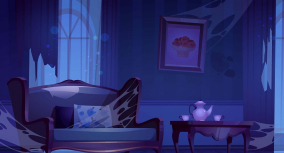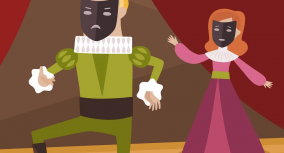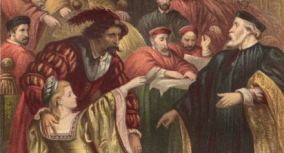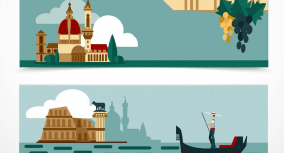There are several overarching themes of The Metamorphosis by Franz Kafka, but only two are crucial. The story starts when the central transformation has already happened. However, each character in the novella goes through its journey: Gregor, Grete, Gregor’s mother, and Gregor’s father. In this article, you’ll see how characters overwent transformation and experienced alienation.
Let’s dive deeper into the theme of The Metamorphosis!

Alienation
Alienation is the most dominant theme in The Metamorphosis. Gregor Samsa, a traveling salesman who works hard to support his family, wakes up late to work one morning. He finds himself turned into an insect overnight and experiences a physical alienation from his own body. As a result of this transformation, he becomes alienated from his work, society, and family. In the third part of the novella, Gregor loses his name and humanity.
However, the reader learns that his life as a human was not much different. Even before this horrendous transformation, Gregor Samsa lives a very alienated life. It is especially apparent in the first lines of the novella. He wakes up as an insect and is obsessed with getting to work. His work dehumanized him long before the transformation happened.
In The Metamorphosis, the theme of isolation is gradually disclosed through Gregor’s thoughts and feelings. As a human, he spends his days traveling for work, sleeping in strange hotel rooms. He lacks friends and has no love life. He takes an enormous responsibility to provide for his entire family and pay off his father’s debts. When he comes back home, Gregor remains locked in his room most of his time, which he developed during traveling. He is emotionally and physically isolated from his family from the very beginning.
The only person in the entire world with whom Gregor has close relationships is his sister Grete. However, his physical changes and her emotional transformation alienates him from her as well. Gregor loses his ability to speak, but he still thinks like a human. He is deeply hurt by the negligence and the attitude that his family shows. No one talks to him, which shows a lack of human connection in the family.
Quotes about Alienation
- “What a strenuous career it is that I’ve chosen! Travelling day in and day out. Doing business like this takes much more effort than doing your own business at home, and on top of that there’s the curse of traveling, worries about making train connections, bad and irregular food, contact with different people all the time so that you can never get to know anyone or become friendly with them”. (Part I)
- “Gregor, however, had no thought of opening the door, and instead congratulated himself for his cautious habit, acquired from his traveling, of locking all doors at night even when he was at home”. (Part I)
- “They had even got used to it, both Gregor and the family, they took the money with gratitude and he was glad to provide it, although there was no longer much warm affection given in return”. (Part II)
- “It’s got to go”, shouted his sister, “that’s the only way, Father. You’ve got to get rid of the idea that that’s Gregor. We’ve only harmed ourselves by believing it for so long. How can that be Gregor? If it were Gregor he would have seen long ago that it’s not possible for human beings to live with an animal like that and he would have gone of his own free will. We wouldn’t have a brother anymore, then, but we could carry on with our lives and remember him with respect. As it is this animal is persecuting us, it’s driven out our tenants, it obviously wants to take over the whole flat and force us to sleep on the streets. Father, look, just look”, she suddenly screamed, “he’s starting again!”. (Part III)
Transformation
The Metamorphosis theme of transformation unifies all three chapters and all the family members together. Overall, the story can be summarized as a transformation of one family.
When Gregor Samsa wakes up, the reader wonders why this metamorphosis occurred in the first place. The characters themselves do not ask this question. Gregor, for instance, is more preoccupied with not getting late for work. Though his family reacts the same until they see him in his new form.
Surprisingly, Gregor is the character that transforms the least. His physical transformation does not directly trigger his mental one, which happened long before his body turned into an insect. That is why Gregor accepts his metamorphosis quickly. In a way, it liberates him from all the problems and heavy duties he carries. Nevertheless, he does acquire some insect habits and preferences, which cause Gregor an insect vs. human type of dilemma.
Gregor does not lose his humanity all along. The story is narrated through his eyes, which allows the reader to sympathize with him. The reader sees how the protagonist reflects on the events and worries about his relatives. Yet his family sees only his external form, so they start referring to him as “it.”
After his family finds out that Gregor turned into an insect, they all have to adjust their way of living. They also change the way they think and feel about Gregor. It is most evident in the case of Grete, Gregor’s beloved sister.
Grete is a young girl who takes upon an enormous responsibility to take care of Gregor. In the beginning, she is the only one who enters his room, feeds him, and tries to remain friendly. The way she speaks and refers to Gregor demonstrates her sympathy towards him. Grete helps Gregor even despite her obvious repulsion by the way he looks. Throughout the novella, she becomes bitter towards her brother and starts seeing him as a burden. It mainly happens because she does not get any response from Gregor. He is unable to communicate, and he hides under the couch most of the time. Even his food preferences have changed (he enjoys rotten food). Grete struggles to comprehend that it is still her brother. She takes pride in taking care of him. However, the reader learns that as she starts working, this load becomes too heavy for her.
Another transformation that the reader sees is the one in the family structure. When the story starts, Gregor is the only provider in the family. According to him, his parents and his young sister are unable to work. After the physical transformation occurs, it becomes no longer possible. Gregor loses his humanity in his family’s eyes as his status changes from being the caregiver to the one who needs to be taken care of. His father, however, regains his masculinity and his headship. It reflects in the way he looks, speaks, and dresses.
One more way Kafka demonstrates the transformation theme in The Metamorphosis is through the changes in Gregor’s room. First, it is clean and filled with furniture and his personal belongings. Gradually Gregor develops insect habits, and the family sees that his new condition might be permanent. Then Grete decides to move away the furniture to help him crawl more freely. Gregor is happy at first but panics when they try to remove it, especially the portrait of a woman. His identity is divided between being a human and being comfortable as an insect. Later, when Grete starts seeing him as a burden, the room gets dusty and filled with unnecessary objects. It becomes Gregor’s prison cell because he is not allowed to leave it. The Metamorphosis deeper meaning demonstrated through the room reflects the change in Gregor’s emotional state. He gets depressed as his room turns into storage. It means that the family does not care about Gregor’s needs anymore.
All the events take place in the Samsa’s apartment, which becomes their prison. The family can break free from it only after Gregor’s death. After the insect body is gone, the parents and Grete regain sympathy and compassion for Gregor. His death, the last transformation, liberates both Gregor and the family by allowing them to move on with their lives.
Quotes about Transformation
- “One morning, when Gregor Samsa woke from troubled dreams, he found himself transformed in his bed into a horrible vermin”. (Part I)
- “He really had not imagined his father the way he stood there now; of late, with his new habit of crawling about, he had neglected to pay attention to what was going on the rest of the flat the way he had done before”. (Part II)
- “Had he really wanted to transform his room into a cave, a warm room fitted out with the nice furniture he had inherited? That would have let him crawl around unimpeded in any direction, but it would also have let him quickly forget his past when he had still been human”. (Part II)
- “Then, quietly, almost whispering as if wanting Gregor (whose whereabouts she did not know) to hear not even the tone of her voice, as she was convinced that he did not understand her words, she added “and by taking the furniture away, won’t it seem like we’re showing that we’ve given up all hope of improvement and we’re abandoning him to cope for himself? I think it’d be best to leave the room exactly the way it was before so that when Gregor comes back to us again he’ll find everything unchanged and he’ll be able to forget the time in between all the easier”. (Part II)
- “He had been reduced to the condition of an ancient invalid and it took him long, long minutes to crawl across his room – crawling over the ceiling was out of the question – but this deterioration in his condition was fully (in his opinion) made up for by the door to the living room being left open every evening. He got into the habit of closely watching it for one or two hours before it was opened and then, lying in the darkness of his room where he could not be seen from the living room, he could watch the family in the light of the dinner table and listen to their conversation – with everyone’s permission, in a way, and thus quite differently from before”. (Part III)






